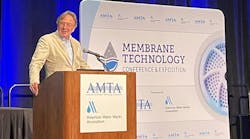The 2007 Stockholm Water Prize laureate speaks out on pioneering biological wastewater treatment processes, water reuse, climate change and the water industry’s challenge in reducing greenhouse gases, and others that contributed to the honor he’ll receive in August in Sweden.
Carlos David Mogollón, Managing Editor
After earning his master’s degree and doctorate from the Massachusetts Institute of Technology in the late 1950s, Prof. Perry McCarty headed west where he has spent almost his entire career in the modest confines of Stanford University’s Department of Civil & Environmental Engineering in northern California.
The year was 1962. And some of the theories McCarty developed in regard to biological water and wastewater treatment processes, particularly fundamental microbiology and chemistry in the design of bioreactors, has had a broad impact on small- and large-scale pollution control and safe drinking water systems. As such, his work has not been limited to those California confines. He’s happy to note it has spread “all over the world.”
For this research, he was announced March 22 on World Water Day as winner of the Stockholm Water Foundation’s top honors this year, a prize that will be awarded in mid-August in Sweden at World Water Week festivities, held there annually since 1991 with the Stockholm International Water Institute.At the core of his work, McCarty stresses is the ability to figure out kinetics in anaerobic (oxygen-less) treatment processes without quantifying the bacteria involved - a problem solved by determination of suspended solids retention time. This led to work with different bacterial microorganisms, which led to studies on how biofilms assist in clarifying water, sludge processing and additional breakthroughs on how potentially harmful contaminants could be broken down via bioremediation processes to their less harmful constituent compounds.
He’s hesitant to single out others for credit since there are so many, but includes among them a Manhattan College researcher for work with fluidized bed reactors and a Dutch researcher’s work on upflow anaerobic sludge blanket reactor (UASBR) systems, both significant milestones. Another involves more recent methods of recapturing methane gas and biosolids from wastewater for reuse as an energy source.
The professor also was involved in California’s Orange County Water District and its Water Factory 21 effort on groundwater reinjection of treated wastewater for later withdrawal and reuse as a potable source. Still, he noted, protecting groundwater is crucial worldwide as it’s 98% of liquid freshwater and 50% of people use it for drinking water. Also, unlike surface water, its containment areas - aquifers - once polluted takes much longer to recover.
With that, he shifts to the issue of climate change. Frustrated by a lack of U.S. leadership to address it, he said there remains room for optimism because of efforts elsewhere - particularly Europe - as well as some in private industry that show promise. He sees a need for each segment of industry and society to do its part to help slow climate change, confessing the water and wastewater industry has some easier “low-hanging fruit” to reach in expanding recycle/reuse technologies and those for heat recovery and co-generation using wastewater offgas, i.e., methane.
“If we capture that, it’s really a biofuel that we can reuse to offset fossil fuels and our dependence on them,” McCarty added. “In our field, with 2-3% of greenhouse gas emissions, we can address that and reduce it. The next group can address their 2-3% and the next its 2-3%. And, first thing we know, the problem’s solved.”
About eight years ago, he became an emeritus professor and gave up classroom teaching. But he’s encouraged by the work of his students, many of whom have gone on to teach as well; and now their students are pressing the research envelope, whether in government, academia or industry.
“So many people have worked together on this issue,” he adds. “Water is certainly a major issue now. Energy is certainly important. The work we’ve done, I think, addresses both of those issues. Biological processes are the natural processes. We should exploit that and understand them as best we can and take advantage of them for our own benefit.”
For the full interview with Prof. McCarty, click through to the online version of this article at www.ww.international.com for a hyperlink to it in Q&A format.





